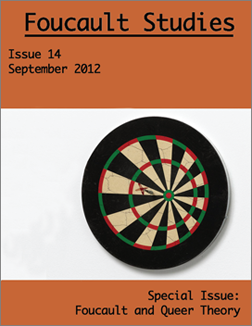Foucault and Sedgwick: The Repressive Hypothesis Revisited
DOI:
https://doi.org/10.22439/fs.v0i14.3888Resumé
This essay examines the Foucauldian foundations of queer theory in the work of Eve Kosofsky Sedgwick. The essay argues that Sedgwick’s increasing disappointment with Foucault’s critique of the repressive hypothesis is in part produced by the slippery rhetoric of The History of Sexuality, Vol. 1: An Introduction. Specifically, Foucault’s use of free indirect discourse in that volume destabilizes both the theory of repression and the critique Foucault mounts against it, thereby rendering ambiguous any political promise his critique might seem to offer. Returning to the fraught relation between Foucault and Sedgwick, the essay concludes by reading Foucault and Sedgwick together through the lens of a reparative ethics in which the felt experience of knowing the world is also an experiment in new ways of living.Downloads
Publiceret
2012-09-14
Citation/Eksport
Huffer, L. (2012). Foucault and Sedgwick: The Repressive Hypothesis Revisited. Foucault Studies, (14), 20–40. https://doi.org/10.22439/fs.v0i14.3888
Nummer
Sektion
Special Issue on Foucault and Queer Theory
Licens
Authors retain copyright to their work, but assign the right of the first publication to Foucault Studies. The work is subject to a CC BY-NC-ND 4.0 license, but despite these restrictions, authors can take for granted that Foucault Studies will permit articles published in Foucault Studies to be translated or reprinted in another format such as a book providing a full reference is made to Foucault Studies as the original place of publication.



